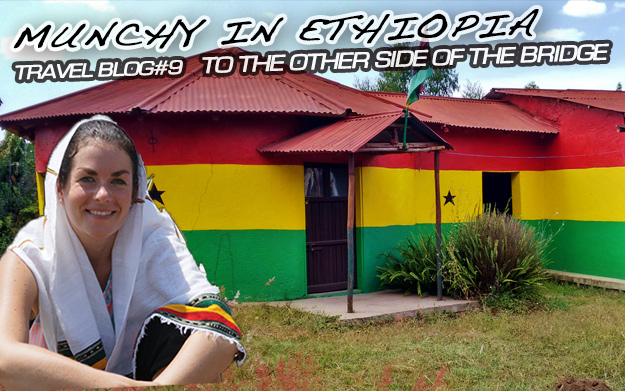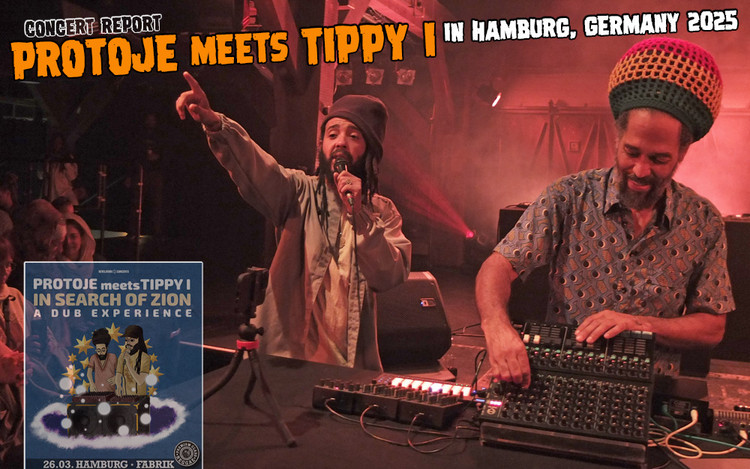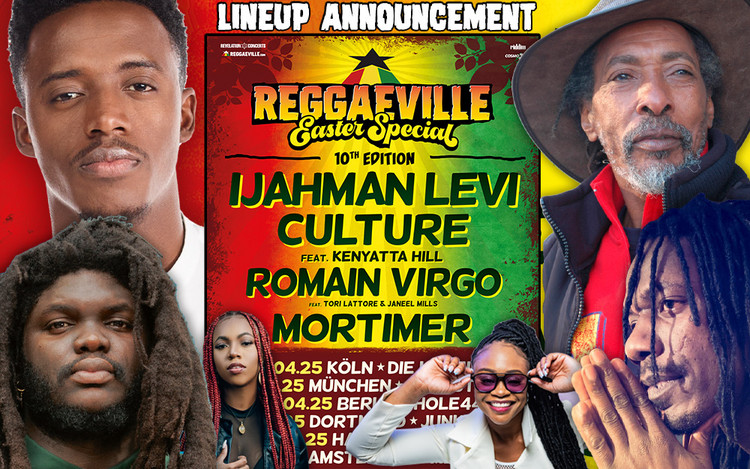Munchy in Ethiopia - To The Other Side of The Bridge (Travel Blog #9)
12/28/2015 by Munchy

Munchy in Ethiopia - Travel Blog Day 9
CLICK HERE TO VIEW THE PHOTO-BLOG
I only spend about 24 hours back in Addis Ababa after leaving Lalibela on a bumpy flight, and take a trip to the calm and peaceful wildlife rescue center of Ensessakotteh with John from the States, an intern at the UN. In comparison to the disgusting lion zoo, the area of the Born Free Foundation is a wonderful experience. They really follow their motto Keep Wildlife In The Wild and give the animals they rescued – lions, cheetahs, baboons, tortoises – wide new homes, where they can live safely and under their natural conditions. Some of them even developed a friendship with the staff of the center and come close to be pet by them. I wish I could do the same, but when I hear the lions roar, I rather keep a respectful distance.
The following day is November 2, Coronation Day of Haile Selassie. Kamila and I could not have picked a better day to travel to Shashamane. Celebrations will be kept there throughout the day, also a stage show and party at the headquarter of The Twelve Tribes of Israel in the evening. For the rest of Ethiopia this day isn't of much significance.
Around noon we hop on the bus from Meskel Square to the South. We were supposed to meet with some Rastafarian friends of ours, but they are all abroad at this point and also our phone isn't working, so no one to reach, who we know, but shouldn't be a problem or should it? After four hours of smooth ride and the a lot less smooth program of Ethiopian's new (endless Casio keyboard and auto-tune) music blasting from the speakers, the bus spits us out by the road-side somewhere in Shashamane. Coming in from the North we passed some Rasta places as well as the Twelve Tribes' headquarter but where we are let off, doesn't look like we expected this city to be at all and no Rasta sistrens or bredrins are anywhere in sight. Colorful shacks line up as usual: vendors, juice houses, coffee places. It's nothing out of the ordinary but the vibe is somewhat negative. Where people would greet you with a smile in other parts of the country there are a lot of skeptical looks and turning backs around here. It only takes a split second for the first kid to smell business and circle us relentlessly asking “Awassa? Yirga Alem? Arba Minch?”. They're all places further down South and someone obviously would like to make his share of our ride, but we are already exactly where we wanted to go. Honeychild is persistent. Cannot say he didn't try as hard as he could. Even as we rest in a little coffee place to have some buna and peace in vain. Eventually he leaves. So does the next hustler.
Kamila and I both have a big tourist book with us, which makes us of course the perfect victims in a place where visitors don't show up that often. It also made us confident, that we could make it around the city by ourselves but as time passes we start to doubt. Somehow we cannot make out any of the roads we are on in our map. There are no Rastafarians but many Muslims entirely covered with only slits for the eyes. No one speaks English or would want to try, instead everyone has the greatest fun pointing their fingers at the helpless forenjis and laughing behind our backs. It takes a khat chewing madman who holds on to Kamila's hand before he threatens to punch me, before at least one Ethiopian yells to leave us alone. By this point I am already so pissed that I wouldn't mind to end up in a fight though, even if it's with a man twice my size. That mager and that stoned, chances are I could have beaten him.  Eventually we enter a pharmacy where the owner understands the name of a guest house that appears with good recommendations in both our books. He organizes a tuk tuk that brings us there. As we drive for another good little while we start to realize how big Shashamane actually is. Later we would find out that it has grown rapidly (something like 500%) in the past few years. The roads we were on are brand new and not yet in our tourist books. The steady rise of the place with many people from the South of Ethiopia but also Somalia, South Sudan or Kenya loosing track on their way to Addis Ababa is one explanation of the tense atmosphere. Around 130,000 live here today – only 500 families are part of the Rastafarian community that made it famous to us.
Eventually we enter a pharmacy where the owner understands the name of a guest house that appears with good recommendations in both our books. He organizes a tuk tuk that brings us there. As we drive for another good little while we start to realize how big Shashamane actually is. Later we would find out that it has grown rapidly (something like 500%) in the past few years. The roads we were on are brand new and not yet in our tourist books. The steady rise of the place with many people from the South of Ethiopia but also Somalia, South Sudan or Kenya loosing track on their way to Addis Ababa is one explanation of the tense atmosphere. Around 130,000 live here today – only 500 families are part of the Rastafarian community that made it famous to us.
Kamila and I get two rooms for a ridiculously cheap price, including breakfast, not a working toilet though. After this day in what feels like the Ethiopian version of the wild, wild west, that sure is the least of my problems now. I finally want to meet the Rastafarian community and celebrate. I am suffering from a severe lack of Reggae these past few weeks. Please let me meet some like-minded people, listen some one drop, and just relax. “Is it possible to go to the Rasta side of town by tuk tuk?” I ask the gentleman at the reception desk after dinner. “No, you cannot go there now!” he answers rapidly. “It's night now. These people, they smoke. You cannot go!” he repeats while he pushes his fingertips onto the desk to reinforce his statement. Aha, ok then. Smoking weed is highly illegal and extremely frowned upon in any part of Ethiopia except for certain areas of Shashamane - obviously. Of course, we still take the tuk tuk. Can it really be any worse than what we experienced earlier? I don't think so. Back we drive all the way we came in today until we reach the headquarter.
For 30 Birr we get to enter: the celebration of Haile Selassie's Coronation Day and finally a place where we feel good, relaxed and welcome. “Would you like to drink something? We have food on sale!” Everyone is heart warming, helpful and smiling. The members of the Twelve Tribes all look beautiful in their red dresses as it's November. The sound system plays classics but also some Chronixx and as it gets later even some Popcaan. “Party shot” for sure. Kamila and I kick back, talk to bredrins from Jamaica and Trinidad. Some of them have been living here for more than 30 years. We also meet some young blood, like Ben, who is Ethiopian but loves the music and came in all the way from Addis to party here tonight. Other teenagers are half Jamaican, half Ethiopian, have never been to the island in the Caribbean but speak Patois and know the lyrics of every song. Enthusiasm has people buss a blank and give forwards as local artists take over the microphone for a little live segment. Feels like Jamaica in Africa, and a little like coming home.
We stay until the last song is played and before we leave Kamila and I are invited into the office, where some of the Twelve Tribes members are summarizing the festivities. For them it's been long two days with no sleep as they have already celebrated Prophet Gad's Earthstrong on November 1st. The elders are just as happy to see us as we are to sit with them. We speak about Jamaica, mutual friends, and the choice of our guest house. “It's okay there for a night, but tomorrow you should come closer, to the other side of the bridge where we stay!” I couldn't agree more.
The next morning we skip breakfast, pack our bags and are back on the tuk tuk as soon as we can. But where to go? The only place we have heard of is the Zion Train Lodge by a French family. As we enter their creatively decorated red gold and green yard, I already see Dieter's motor bike from far. What a great coincidence! My company from Lalibela spent the night camping at Lake Langano and was also looking for some coffee along his route that will eventually lead him to Kenya in a few days from now. We catch up once more and Dieter gets to experience the laid-back lifestyle of “soon come” that apparently came from Jamaica to Ethiopia with the repatriates. He wants to exchange money with a guy that should be here in five minutes... ten minutes... just another five minutes... or never. After our final Good-Bye and some delicious crepes Kamila and I are ready for the road. Buna time!
We are said to be 1,200 meters off the main road where we should find some nice coffee places. Kool, no problem, so we walk, right? So do about 500 children that just finished school. And they are not that kool. As we make our way through the crowd I see stones flying. Then more. And somehow they all seem to be thrown in our direction. We heard of that but I would have not believed in children being so cruel until I experienced it myself. I turn around to make a point: “No more throwing of stones!” I say with a strong voice. Hilarious statement of mine! It doesn't keep the kids from attacking us but makes their game even more challenging. It just stepped up from “Who can hit forenji?” to “Who dares to hit angry forenji?”. After both Kamila and I get hit by a stone in the face we seek shelter in some random food shack where two women peel potatoes for lunch. We greet them in Amharic, they don't say a word. Skeptical looks just like yesterday, I guess that means “Welcome to Shashamane”.
Just before I feel like jumping on the next bus to return to Addis we finally meet more Rasta bredrins. They show us their museum and art galleries, the headquarter of the Bobo Ashanti, and tell us about a German member of the community. If I want to visit him? Sure, I do.  After a little walk through the neighborhood we reach bredda Wantu. He is actually Trinidadian, married to a German and has been living in the area where my mom's family comes from for almost ten years, before he moved to Shashamane. He invites us into his lovely yard with a nice house he built himself and a lush garden where he, like most members of the community grows as much of his own food as he can: guava, lime, banana, even zucchini and pak choi. He and fellow Trini brother Levi are a joy to speak to and Kamila and I experience a wonderful afternoon with interesting conversations, coffee, and even some real Jamaican food from the nearby restaurant: steamed veg with salad, rice and peas, and soursop juice.
After a little walk through the neighborhood we reach bredda Wantu. He is actually Trinidadian, married to a German and has been living in the area where my mom's family comes from for almost ten years, before he moved to Shashamane. He invites us into his lovely yard with a nice house he built himself and a lush garden where he, like most members of the community grows as much of his own food as he can: guava, lime, banana, even zucchini and pak choi. He and fellow Trini brother Levi are a joy to speak to and Kamila and I experience a wonderful afternoon with interesting conversations, coffee, and even some real Jamaican food from the nearby restaurant: steamed veg with salad, rice and peas, and soursop juice.
We find out about Shashamane's rapid growth and the struggles of the Rasta community in Ethiopia. Many of them are still considered illegal immigrants by the law and with Haile Selassie leaving the scene the legal foundation of repatriation slowly disappeared. Up until today a lot of land was taken back again. People have to fight for their homes with lawyers and live on sufferance. Children of repatriates were born here yet never got Ethiopian citizenship. They always have to renew their visas. The daily penalty fees for overstays just rose again. Some people have been overstaying for over a decade. On one hand they are home now, right, but traveling and exploring Africa is not an option for them. Do the maths why.
The Trini is a hard-working and diligent man. He built houses for people willing to repatriate. He lives in the Motherland, where he was meant to reside and is just like everyone else we meet happy to be here, but in his voice you can also hear the disappointment when he speaks of those, whom he built houses for and that still didn't come. One of the homes he offers Kamila and me to stay in. It is a cute building with a rich garden full of banana plants and vegetables. A solar panel brings electricity and the tank offers water even when the pipes are closed. The government is enthusiastic about cutting new, broad roads that lead to frequent power and water cuts and of course decreasing properties – possibly improvement, possibly another way to harass the weed smoking foreigners. Two dogs keep us company and guard us from the outside world where throwing stones at us doesn't remain a singular event and the neighbor had just been stolen her phone from her hand while she was speaking. We are more than grateful for our house, a safe place where we can breath peacefully and engange in enlightning and inspiring conversations while enjoying Wantu's delicious dinner of rice and homegrown veg.
With new friends and a place to call home Kamila and I decide to stay another day and take a trip to Awassa the next morning. The bus ride is about half an hour. It's a bright sun shiny day, the perfect weather for a walk along the lakefront where fresh fish and injera is offered in various little restaurants. Blue skies meet the green reeds swaying in the wind as we wander by. We enjoy an extensive breakfast with peanut tea and fresh juice right by the water and read our books until our eyes get tired. Just before we fall asleep we decide to treat ourselves with a boat ride. It's been two stressful days and this is still somewhat of a vacation for us. Lake Awassa boasts a great variety of birds and is also said to have hippos. After not seeing any of them in Bahir Dar my expectations are pretty low.  I am happy to explore the landscape with big hills seeming to end right into the water. Just as I press the button of my camera to take a picture of the area out of nowhere daddy hippo photobombs my still, literally as if he was just waiting for my click. With no success to catch any hippo on camera after that, this remains as my only photo but it's the best because I never took it but the animal gave it to me. I am super excited. Kamila and I watch the hippo family including the parents, the son and the baby and a load of birds I cannot name. Despite some rain we have a great day in Awassa and another good night at home in Shashamane.
I am happy to explore the landscape with big hills seeming to end right into the water. Just as I press the button of my camera to take a picture of the area out of nowhere daddy hippo photobombs my still, literally as if he was just waiting for my click. With no success to catch any hippo on camera after that, this remains as my only photo but it's the best because I never took it but the animal gave it to me. I am super excited. Kamila and I watch the hippo family including the parents, the son and the baby and a load of birds I cannot name. Despite some rain we have a great day in Awassa and another good night at home in Shashamane.
The following noon we say Goodbye to Wantu and Levi. If it wasn't for them and other members of the Rastafarian community we would not have stayed that long, but their cordiality, kindness, and generosity has turned even this city into a place worth staying. We wish them nothing but the best!
Overall I had an amazing time in Ethiopia. Not entirely easy, sometimes rough, physically or mentally exhausting, but always fascinating, amazing, enriching, and broadening my horizon (and the horizon in Ethiopia is faaaar sometimes). Bet am amesegnalu!
CLICK HERE TO VIEW THE PHOTO-BLOG









